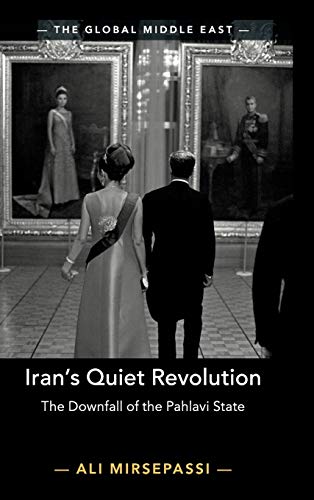Verwandte Artikel zu Iran’s Quiet Revolution: The Downfall of the...
Iran’s Quiet Revolution: The Downfall of the Pahlavi State: 9 (The Global Middle East, Series Number 9) - Hardcover

Inhaltsangabe
Offering a new perspective on Iran's politics and culture in the 1960s and 1970s, Ali Mirsepassi challenges the prevailing view of pre-Revolution Iran, documenting how the cultural elites of the Pahlavi State promoted a series of striking 'Gharbzadegi' or 'Westoxification' discourses. Intended as ideological alternatives to modern and Western-inspired cultural attitudes, these influenced Persian identity politics, and projected Iranian modernity as a 'mistaken modernity' despite the regime's own ferocious modernisation programme. Focusing on the cultural transformations which defined the period, Mirsepassi sheds new light on the Pahlavi State as an ideological gambler, inadvertently empowering its fundamentalist enemies and spreading a 'quiet revolution' through secular and religious civil society. Proposing a new theoretical framework for understanding the anti-modern discourses of Ahmad Fardid, Jalal Al-e Ahmad, and Ali Shari'ati, Iran's Quiet Revolution is a radical re-interpretation of twentieth century Iranian political history which makes sense of these events within the creative, yet tragic Iranian nation-making experience.
Die Inhaltsangabe kann sich auf eine andere Ausgabe dieses Titels beziehen.
Über die Autorin bzw. den Autor
Ali Mirsepassi is the Albert Gallatin Research Excellence Professor of Middle Eastern and Islamic studies at Gallatin and in the Department of Middle Eastern and Islamic Studies in the Faculty of Arts and Science at New York University where he is also the director of the Iranian Studies Initiative. He is the author of numerous books including Islam, Democracy, and Cosmopolitanism (Cambridge, 2014), Transnationalism in Iranian Political Thought: The Life and Times of Ahmad Fardid (Cambridge, 2017), Iran's Troubled Modernity: Debating Ahmad Fardid's Legacy (Cambridge, 2018) and co-editor of The Global Middle East series, with Arshin Adib-Moghaddam.
„Über diesen Titel“ kann sich auf eine andere Ausgabe dieses Titels beziehen.
Gratis für den Versand innerhalb von/der USA
Versandziele, Kosten & DauerNeu kaufen
Diesen Artikel anzeigenEUR 7,56 für den Versand innerhalb von/der USA
Versandziele, Kosten & DauerSuchergebnisse für Iran’s Quiet Revolution: The Downfall of the...
Iran's Quiet Revolution: The Downfall of the Pahlavi State (The Global Middle East, Series Number 9)
Anbieter: Best Price, Torrance, CA, USA
Zustand: New. SUPER FAST SHIPPING. Bestandsnummer des Verkäufers 9781108485890
Anzahl: 2 verfügbar
Iran's Quiet Revolution: The D
Anbieter: SecondSale, Montgomery, IL, USA
Zustand: Good. Item in good condition. Textbooks may not include supplemental items i.e. CDs, access codes etc. Bestandsnummer des Verkäufers 00083728619
Anzahl: 1 verfügbar
Iran's Quiet Revolution: The Downfall of the Pahlavi State (The Global Middle East, Series Number 9)
Anbieter: Lucky's Textbooks, Dallas, TX, USA
Zustand: New. Bestandsnummer des Verkäufers ABLIING23Mar2317530285248
Anzahl: Mehr als 20 verfügbar
Iran's Quiet Revolution: The Downfall of the Pahlavi State (The Global Middle East, Series Number 9)
Anbieter: California Books, Miami, FL, USA
Zustand: New. Bestandsnummer des Verkäufers I-9781108485890
Anzahl: Mehr als 20 verfügbar
Iran's Quiet Revolution (Hardcover)
Anbieter: Grand Eagle Retail, Mason, OH, USA
Hardcover. Zustand: new. Hardcover. Offering a new perspective on Iran's politics and culture in the 1960s and 1970s, Ali Mirsepassi challenges the prevailing view of pre-Revolution Iran, documenting how the cultural elites of the Pahlavi State promoted a series of striking 'Gharbzadegi' or 'Westoxification' discourses. Intended as ideological alternatives to modern and Western-inspired cultural attitudes, these influenced Persian identity politics, and projected Iranian modernity as a 'mistaken modernity' despite the regime's own ferocious modernisation programme. Focusing on the cultural transformations which defined the period, Mirsepassi sheds new light on the Pahlavi State as an ideological gambler, inadvertently empowering its fundamentalist enemies and spreading a 'quiet revolution' through secular and religious civil society. Proposing a new theoretical framework for understanding the anti-modern discourses of Ahmad Fardid, Jalal Al-e Ahmad, and Ali Shari'ati, Iran's Quiet Revolution is a radical re-interpretation of twentieth century Iranian political history which makes sense of these events within the creative, yet tragic Iranian nation-making experience. Challenging the prevailing view of pre-Revolution Iran, this new perspective on Iranian politics and culture in the 1960s and 70s documents how the Pahlavi State adopted 'Westoxification' discourses to present ideological alternatives to modern and Western-inspired cultural attitudes in Iran. Shipping may be from multiple locations in the US or from the UK, depending on stock availability. Bestandsnummer des Verkäufers 9781108485890
Anzahl: 1 verfügbar
Iran's Quiet Revolution: The Downfall of the Pahlavi State (The Global Middle East, Series Number 9)
Anbieter: Ria Christie Collections, Uxbridge, Vereinigtes Königreich
Zustand: New. In. Bestandsnummer des Verkäufers ria9781108485890_new
Anzahl: Mehr als 20 verfügbar
Iran's Quiet Revolution: The Downfall of the Pahlavi State
Print-on-DemandAnbieter: THE SAINT BOOKSTORE, Southport, Vereinigtes Königreich
Hardback. Zustand: New. This item is printed on demand. New copy - Usually dispatched within 5-9 working days 518. Bestandsnummer des Verkäufers C9781108485890
Anzahl: Mehr als 20 verfügbar
Iran's Quiet Revolution: The Downfall of the Pahlavi State
Print-on-DemandAnbieter: Revaluation Books, Exeter, Vereinigtes Königreich
Hardcover. Zustand: Brand New. 242 pages. 9.25x6.25x0.75 inches. In Stock. This item is printed on demand. Bestandsnummer des Verkäufers __1108485898
Anzahl: 1 verfügbar
Iran's Quiet Revolution: The Downfall of the Pahlavi State (The Global Middle East, Series Number 9)
Anbieter: Books Puddle, New York, NY, USA
Zustand: New. Bestandsnummer des Verkäufers 26380371053
Anzahl: 4 verfügbar
Iran's Quiet Revolution: The Downfall of the Pahlavi State (The Global Middle East, Series Number 9)
Print-on-DemandAnbieter: Majestic Books, Hounslow, Vereinigtes Königreich
Zustand: New. Print on Demand. Bestandsnummer des Verkäufers 383500210
Anzahl: 4 verfügbar

